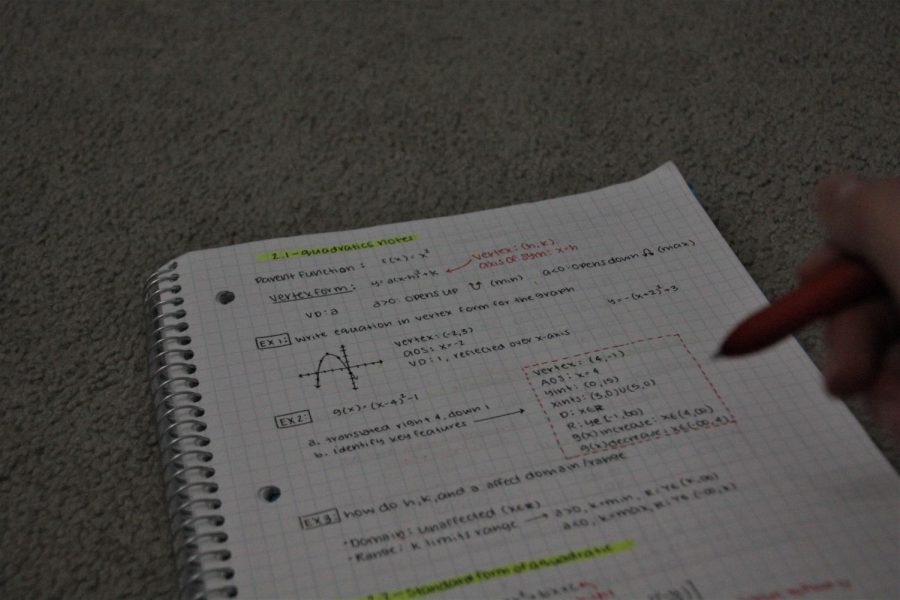The Height of Homework
TOO MUCH HOMEWORK: Homework is affecting students in various ways. In recent years, however, more negative effects have emerged according to students. The continuing effect will need to be observed and changes will have to be made if the needs of students will be satisfied.
December 9, 2019
Every day, students in all grades receive plenty of work that they need to finish within a certain time. Students also need to manage their school lives along with their extracurricular activities and social lives. This gets tougher as the students grow older.
Homework is present in almost every class, but compared to the past few years, the amount given to high-school students has significantly increased. This is making students more stressed due to the heavy workload and consequent lack of sleep. The effects of an increasing amount of homework among teenage populations continue to become amplified, and soon may be “dangerous” towards younger students. An article mentions, “Today’s youngest students seem to have more homework than in the past.”
Sophomore Surya Bollapragada stated, “I get around five hours of homework per day.” If the calculations are done and a student does his or her homework continuously from 6:00 p.m., then they will not be done with their homework till 11:00 p.m. Once you add meal times, activities, and time with family, this can be pushed to a time which results in very limited amounts of sleep. Insufficient sleep leads to students’ health deteriorating as they end up being sleep deprived. Both freshman Marcus Hue-Weller and senior Shashank Rao said that they get “between five to six hours of sleep,” showing that high schoolers do not even get seven hours of sleep, the minimum amount that teenagers should be receiving.
The question now is how effective is homework and how would students feel if the amount was decreased? An article, The Homework Debate: The Case Against Homework states, “When students all receive the same photocopied assignment which is then checked as complete rather than discussed individually with the student, is ‘not very effective.’ It goes on to say that, ‘if there’s no feedback and no monitoring, the homework is probably not effective.’” When homework assignments are checked off based on completion or go in a zero percent category, the time inputted to the assignment becomes a waste and it does not affect a student’s understanding at all. Pew Research Center states, “The 21st century has so far been a homework-heavy era, with American teenagers now averaging about twice as much time spent on homework each day as their predecessors did in the 1990s.” Students are working very hard but their work is not being valued as much as it could be. However, junior Meghana Annamaneni says that “without homework, I would not have a good understanding of the concept as I won’t have practice. The amount of work could be reduced though.”
Students at IHS claim that teachers set very high expectations for students and do not communicate with each other, resulting in three to five tests in one day and maybe only one to two hours of sleep the night before a test. While teachers may advise to start studying earlier, students ignore the suggestion either because they have not completed learning the concept, which hinders their ability to comprehend the topic, or, students are not provided with sufficient study material by the teachers. Another thing to keep in mind is the increasing talent in our society today. In order to maintain and grow this advantage, it requires a lot of time, effort, and hard work. When students spend their entire weekend dedicated to a certain activity, having three tests the day they return is an arduous experience. Many students complain about this problem, but with no sleep, students continue to develop a negative outlook towards life, eventually leading to the downfall in their health. Students hope that teachers, specifically at IHS, begin to share events in their classes so students have reasonable workloads each night.
However, some teachers are taking initiative and implying a flipped classroom system. Another article, How Much Homework Is Enough? Depends Who You Ask mentions, “… The nature of homework is changing. One influence is the growing popularity of the so-called flipped classroom.” This system allows students to learn a concept at home and do homework in class, where teachers can physically help students if they need it.
As time passes, the amount of homework assigned to students has grown and continues to do so. The district is discussing possible solutions to the growing amount of homework, and hopefully, they will take action soon.



